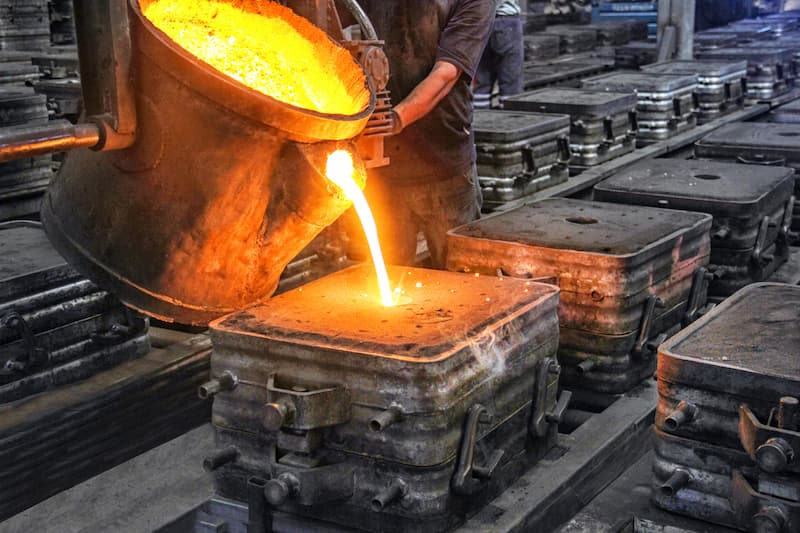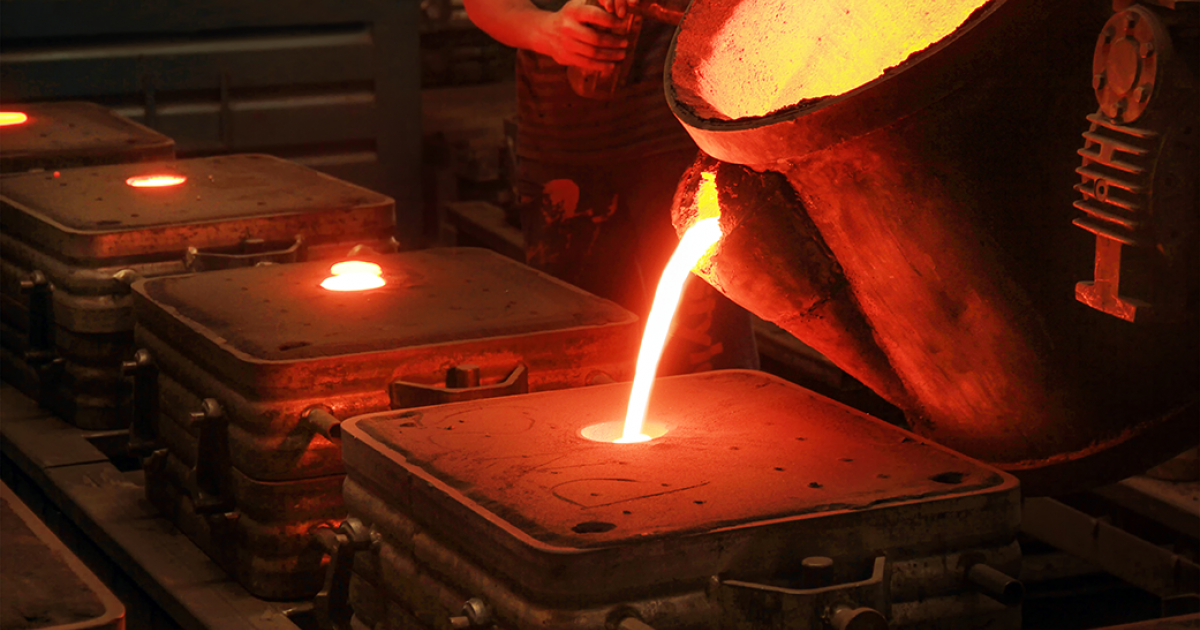Why Modern Foundries Blend Traditional Metal Casting with Automation
Wiki Article
A Comprehensive Overview to Metal Casting: Benefits and Services Provided by Foundries
Metal casting is an essential process in various sectors, supplying various benefits via the services of factories. These centers transform liquified metal into durable and precise components, satisfying specific customer needs. By employing innovative technologies, shops ensure high quality and effectiveness in manufacturing. Nonetheless, the complexities of metal casting and the varied methods involved elevate crucial questions about its role in modern manufacturing. What innovations exist in advance in this important area?Understanding the Metal Casting Process
The metal casting process is a fundamental technique made use of in making to produce complicated shapes and elements. This approach involves putting liquified metal right into a mold developed to develop the desired things. The process starts with pattern creation, which functions as a design template for the mold. Aluminum Casting. Different products, such as sand, metal, or ceramic, are made use of for mold-making, relying on the details needs of the casting
Once the mold and mildew is ready, molten metal is put into it and permitted to solidify and cool down. After solidification, the mold is eliminated, disclosing the cast component. Different methods, consisting of sand casting, investment casting, and die casting, are used, each fit to different applications and products. Quality assurance actions, such as inspections and testing, are necessary to guarantee the end product satisfies specifications. On the whole, the metal casting process plays a crucial function in creating components for industries ranging from automobile to aerospace.
Trick Advantages of Metal Casting
Metal casting provides considerable advantages that make it a preferred production approach in different markets. Its layout adaptability and precision enable detailed shapes, while affordable automation enhances efficiency. Furthermore, the convenience and stamina of products used in casting add to the toughness of the final items.Design Versatility and Precision
Launching remarkable design flexibility and accuracy, metal casting enables designers and developers to create intricate forms and features that would certainly be difficult or difficult to attain with various other manufacturing techniques. This capability enables the production of intricate geometries, interior frameworks, and great information that boost product capability and appearances. Furthermore, various casting methods, such as sand casting, investment casting, and pass away casting, give further choices for modification, accommodating varied product properties and project needs. The versatility of molds permits adjustments during the style stage, streamlining the shift from idea to final product. Ultimately, metal casting attracts attention for its ability to deliver high-precision parts, making it an important process in markets varying from vehicle to aerospace and beyond.Cost-efficient Mass Production
Affordable mass manufacturing stands as one of the key advantages of metal casting, allowing suppliers to generate large quantities of parts at a reduced cost each. This efficiency arises from the ability to create detailed mold and mildews that can be recycled multiple times, substantially decreasing arrangement and operational costs. In addition, metal casting procedures, such as sand casting and pass away casting, enable high throughput, making it practical to meet the needs of massive manufacturing runs. The decreased material waste and energy consumption even more enhance cost financial savings, making metal casting an appealing alternative for sectors needing mass components. Overall, the cost-effective nature of metal casting positions it as a recommended approach for manufacturers intending for economic effectiveness in their production processes.Material Versatility and Stamina
One of the standout characteristics of metal casting is its amazing product flexibility, which enables for using a broad variety of steels and alloys. This versatility enables suppliers to choose materials that ideal fit their details applications, from light weight aluminum and bronze to iron and steel. Each metal supplies one-of-a-kind residential properties, consisting of differing levels of stamina, deterioration resistance, and thermal conductivity. Consequently, metal casting can generate components that satisfy rigid performance needs throughout diverse markets, such as automobile, aerospace, and building and construction. In addition, the toughness of cast steels can be boosted through various therapy procedures, guaranteeing sturdiness and longevity. Aluminum Foundry. In general, the combination of product flexibility and intrinsic strength makes metal casting a preferred selection for generating premium componentsKinds Of Metal Casting Methods
Metal casting incorporates a range of methods that accommodate different production requirements and material homes. Usual techniques include sand casting, which makes use of a sand mold for complex forms, and financial investment casting, known for its accuracy and surface area finish. Pass away casting is one more strategy that utilizes high-pressure shot of molten metal into mold and mildews, suitable for mass production of small parts.Shell molding uses a faster alternative, utilizing a resin-coated sand to develop thin-walled molds, while shed foam casting permits for intricate designs without the demand for a core.
Furthermore, continual casting is made use of for producing lengthy sections of metal, such as bars or sheets, by solidifying molten metal in a continual procedure. Each strategy offers distinct benefits and is picked based on variables like the called for information, manufacturing volume, and material type, guaranteeing remarkable outcomes in metal manufacture throughout different markets.
The Function of Foundries in Metal Casting
Shops play a critical duty in the metal casting procedure, serving as the centers where liquified metal is changed into finished products. These specialized facilities are furnished with the necessary devices and technologies to deal with various metals, making certain high-quality outcomes. Factories are in charge of a number of important functions, including thawing the metal, putting it right into mold and mildews, and allowing it to strengthen.Additionally, they keep strict safety and environmental standards to secure employees and reduce ecological effect. Competent professionals and engineers collaborate to optimize casting processes, enhancing efficiency and reducing waste. Factories also take part in quality assurance measures, making sure that the end products meet details resistances and requirements. This high quality assurance is vital for markets that depend on specific elements, such as vehicle and aerospace. As an outcome, shops add considerably to the total production landscape, enabling advancement and development throughout various sectors.
Custom Metal Casting Providers
Custom-made metal casting solutions offer customized layout remedies that meet certain client demands. These services additionally provide material option experience, ensuring the appropriate metal is selected for the desired application. Such flexibility and understanding enhance the general high quality and performance of the end product.
Tailored Layout Solutions
Customized style solutions in metal casting offer manufacturers with the adaptability to produce elements that meet certain performance and visual requirements. Foundries provide customized services that allow customers to specify measurements, shapes, and surface coatings to achieve desired outcomes. This personalization procedure commonly consists of cooperation in between developers and engineers, making sure that the final items straighten with functional needs and industry criteria. Advanced technologies, such as computer-aided layout (CAD) and simulation software, allow precise modeling and screening of components prior to manufacturing, enhancing and reducing errors performance. By leveraging customized layout options, businesses can enhance functionality while reducing waste and prices, Go Here inevitably leading to a more one-upmanship in the market. This flexibility is necessary for industries needing one-of-a-kind applications and specs.Material Selection Knowledge
When picking materials for metal casting, proficiency plays a necessary role in guaranteeing that the best option straightens with both efficiency needs and cost-effectiveness. Shops employ competent experts that recognize the residential or commercial properties of numerous steels and alloys, enabling them to recommend ideal materials for particular applications. Variables such as toughness, rust resistance, and thermal conductivity are meticulously taken into consideration to satisfy the customer's needs. In addition, sector fads and developments in product scientific research inform these choices, making it possible for shops to stay competitive. By leveraging their expertise, factories can help customers in steering through complicated product alternatives, ultimately leading to boosted product top quality and decreased manufacturing costs. This specific knowledge is essential for accomplishing effective end results in custom-made metal casting services.High Quality Control in Metal Casting
Quality control in metal casting is crucial to ensure that the end products satisfy the required specs and efficiency criteria. Factories use a variety of strategies and approaches to assure the best quality of cast parts. This procedure starts with rigorous product examinations, verifying that resources abide with industry criteria. Throughout the casting process, real-time surveillance and testing are carried out to examine specifications such as temperature, mold and mildew honesty, and dimensional accuracy.
Applications of Metal Castings Throughout Industries
Metal spreadings play a critical role in various industries, serving as the backbone for countless applications. In the vehicle industry, cast components such as engine blocks and transmission real estates are essential for lorry efficiency and reliability. The aerospace market counts on precision spreadings for crucial components that ensure safety and performance in flight. In addition, the building industry makes use of metal castings for components, installations, and architectural components, boosting the durability of structures and facilities.In addition, the energy field advantages from spreadings used in turbine blades and other tools vital for power generation - Metal Casting. The clinical area likewise uses metal castings in devices and tools, showing the adaptability of this manufacturing procedure. Generally, metal castings are integral to the capability and improvement of diverse industries, showcasing their value in contemporary innovation and infrastructure development
Frequently Asked Concerns
What Materials Are Frequently Used in Metal Casting?
Usual products made use of in metal casting consist of light weight aluminum, iron, bronze, steel, and brass. Each material offers distinct buildings appropriate for numerous applications, permitting makers to pick the finest alternative based on corrosion, weight, and toughness resistance.How much time Does the Metal Casting Refine Commonly Take?
The metal casting process usually takes several hours to a few days, relying on factors such as the intricacy of the style, type of metal made use of, and the details casting technique utilized by the foundry.
What Is the Environmental Impact of Metal Casting?
The environmental impact of metal casting consists of energy usage, discharges, and waste generation. Foundries typically carry out steps to reduce these impacts, such as reusing products and using her response cleaner technologies to decrease their ecological footprint.Can Metal Casting Be Done for Small-Scale Projects?
Metal casting can without a doubt be executed for small projects. Different factories satisfy such needs, offering tailored remedies that accommodate minimal manufacturing runs while preserving quality and precision in the end products.What Are the Safety And Security Procedures in Metal Casting Foundries?
In metal casting shops, precaution consist of individual safety tools, appropriate ventilation, training on devices usage, emergency procedures, regular maintenance checks, and adherence to industry security criteria to minimize dangers connected with liquified metal and dangerous products.Additionally, metal casting procedures, such as sand casting and die casting, allow for high throughput, making it viable to satisfy the needs of large-scale production runs. One of the standout qualities of metal casting is its amazing product versatility, which enables for the usage of a broad variety of metals and alloys. Furthermore, continual casting is made use of for creating lengthy areas of metal, such as sheets or bars, by strengthening molten metal in a continuous process. Foundries play an essential duty in the metal casting procedure, serving as the facilities where molten metal is changed into completed products. why not check here Common products used in metal casting include light weight aluminum, iron, brass, steel, and bronze.
Report this wiki page